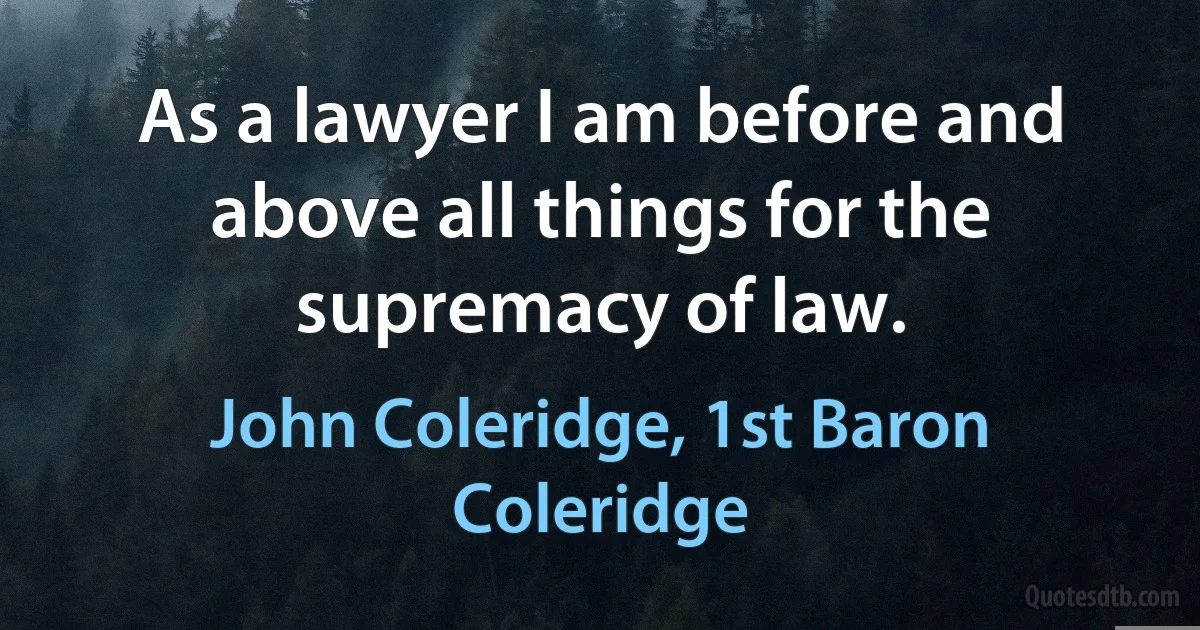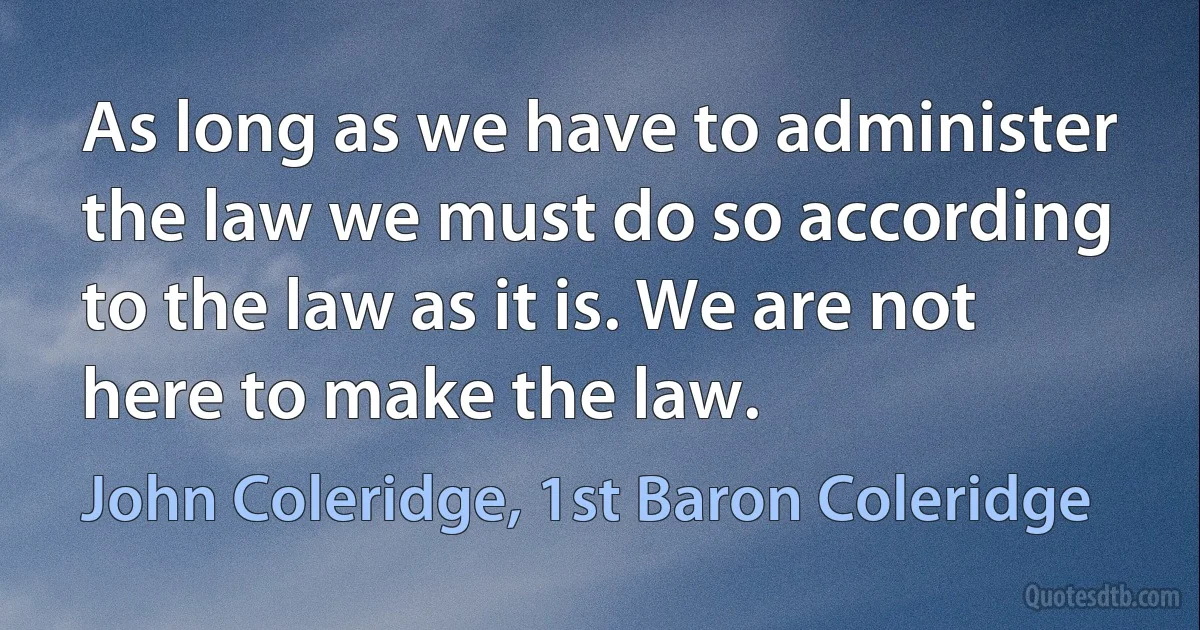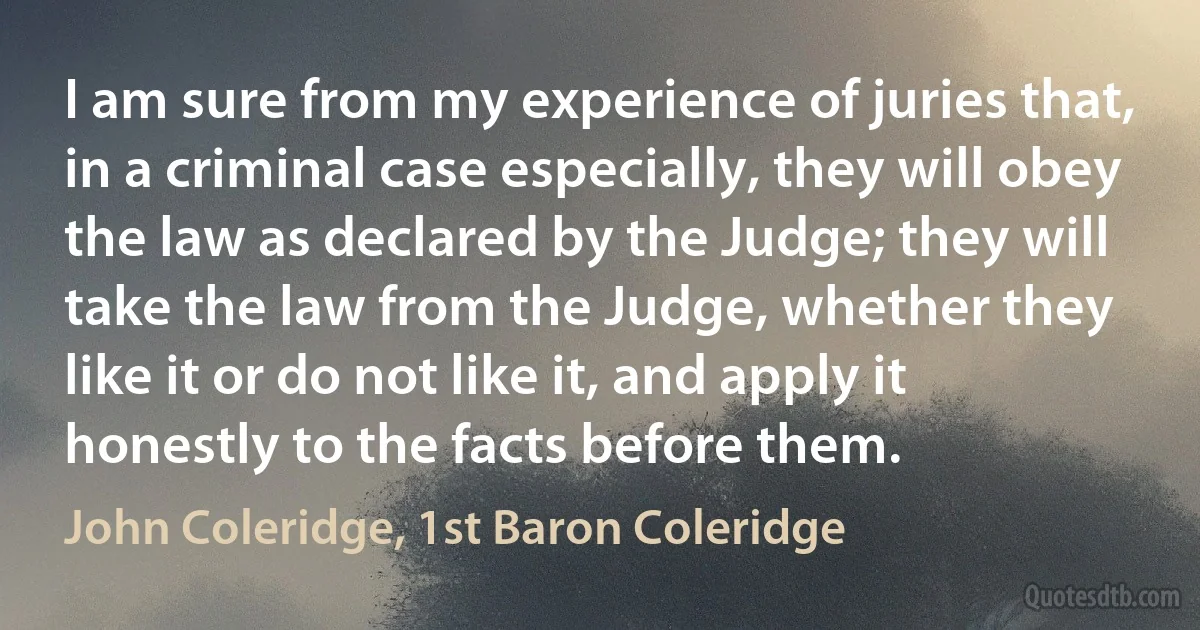John Coleridge, 1st Baron Coleridge quotes
The moment juries or judges go beyond their functions, and take upon themselves to lay down the law or find the facts, not according to the law as it is, but according to the law as they think it ought to be, then the certainty of the law is at an end; there is nothing to rely upon; we are left to the infinite variety and uncertainty of human opinion; to caprice which may at any moment influence the best of us, to feelings and prejudices, perhaps excellent in themselves, but which may distort or disturb our judgment, and distract our minds from the single simple operation of ascertaining whether the facts proved bring the case within the law as we are bound to take it.

John Coleridge, 1st Baron Coleridge
I for one would never be a party, unless the law were clear, to saying to any man who put forward his views on those most sacred things, that he should be branded as apparently criminal because he differed from the majority of mankind in his religious views or convictions on the subject of religion. If that were so, we should get into ages and times which, thank God, we do not live in, when people were put to death for opinions and beliefs which now almost all of us believe to be true.

John Coleridge, 1st Baron Coleridge
I was brought up under a system in which discretion when given was practically absolute. It was the unbroken tradition of Westminster Hall. I believe that system worked justice and saved expense. I hope I may be forgiven if, with what energy remains to me, I strive after many years' experience and drawing near the close of my judicial career, to preserve this unfettered discretion which in my opinion, was given me by Parliament, and which I have never, at least intentionally abused.

John Coleridge, 1st Baron Coleridge
It is no longer true in the sense in which it was true when these dicta were uttered, that " Christianity is part of the law of the land." Nonconformists and Jews were then under penal laws, and were hardly allowed civil rights. But now, so far as I know the law, a Jew might be Lord Chancellor. Certainly he might be Master of the Rolls, and the great Judge whose loss we have all had to deplore2 might have had to try such a case, and if the view of the law supposed be correct, he would have had to tell the jury, perhaps partly composed of Jews, that it was blasphemy to deny that Jesus Christ was the Messiah, which he himself did deny, and which Parliament has allowed him to deny, and which it was part of " the law of the land " that he might, deny.

John Coleridge, 1st Baron Coleridge
Law grows, and though the principles of law remain unchanged, yet (and it is one of the advantages of the common law) their application is to be changed with the changing circumstances of the times. Some persons may call this retrogression, I call it progression of human opinion.

John Coleridge, 1st Baron Coleridge
To me the entire uselessness of such rules^as practical guides lies in the inherent vagueness of the word "reasonable," the absolute impossibility of finding a definite standard, to be expressed in language, for the fairness and the reason of mankind, even of Judges. The reason and fairness of one man is manifestly no rule for the reason and fairness of another, and it is an awkward, but as far as I see, an inevitable consequence of the rule, that in every case where the decision of a Judge is overruled, who does or does not stop a case on the ground that there is, or is not, reasonable evidence for reasonable |men, those who overrule him say, by implication, that in the case before them, the Judge who is overruled is out of the pale of reasonable men.

John Coleridge, 1st Baron Coleridge
However much men may honestly endeavour to limit the exercise of their discretion by definite rule, there must always be room for idiosyncracy; and idiosyncracy, as the word expresses, varies with the man. But there is, besides this, that of which every student of legal history must be aware, the leaning of the Courts for a certain time in a particular direction, balanced at least, if not reversed, by the leaning of the Courts for a certain time in a direction opposite. The current of legal decision runs often to a point which is felt to be beyond the bounds of sound and sane control, and there is danger sometimes that the retrocession of the current should become itself extreme.

John Coleridge, 1st Baron Coleridge
John Coleridge, 1st Baron Coleridge
Occupation: British LawyerBorn: December 3, 1820
Died: June 14, 1894
Quotes count: 24
Wikipedia: John Coleridge, 1st Baron Coleridge





